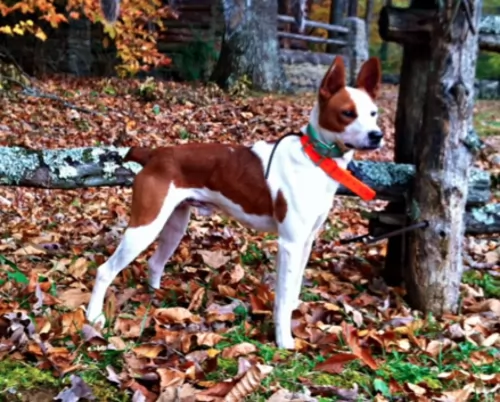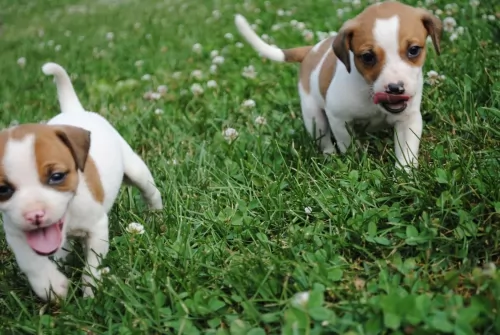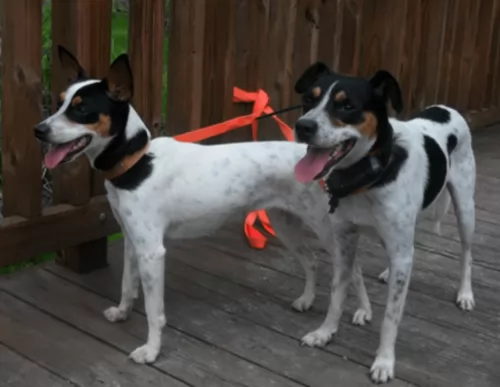 Petzlover
Petzlover Australian Silky Terrier is originated from Australia but Mountain Feist is originated from United States. Australian Silky Terrier may grow 30 cm / 11 inches shorter than Mountain Feist. Australian Silky Terrier may weigh 48 kg / 105 pounds lesser than Mountain Feist. Australian Silky Terrier may live 3 years less than Mountain Feist. Australian Silky Terrier may have less litter size than Mountain Feist. Australian Silky Terrier requires Moderate Maintenance. But Mountain Feist requires Low Maintenance
Australian Silky Terrier is originated from Australia but Mountain Feist is originated from United States. Australian Silky Terrier may grow 30 cm / 11 inches shorter than Mountain Feist. Australian Silky Terrier may weigh 48 kg / 105 pounds lesser than Mountain Feist. Australian Silky Terrier may live 3 years less than Mountain Feist. Australian Silky Terrier may have less litter size than Mountain Feist. Australian Silky Terrier requires Moderate Maintenance. But Mountain Feist requires Low Maintenance
 Many toy breeds have been bred for centuries and were kept as lap dogs and companion dogs. Known at first as ‘The Sydney Silk’ the Australian Silky Terrier originated in Australia, but before the 2nd World War, the Australian SilkyTerrier was all but unknown outside Australia.
Many toy breeds have been bred for centuries and were kept as lap dogs and companion dogs. Known at first as ‘The Sydney Silk’ the Australian Silky Terrier originated in Australia, but before the 2nd World War, the Australian SilkyTerrier was all but unknown outside Australia.
The toy breed came about by crossing the Yorkshire Terrier and the Australian Terrier, but further crossings contributed to the silky coat and the small size we are familiar with today. Despite this little dog being classified in the Toy Group, this spunky dog has the ability to hunt and kill rodents.
Victorian and Tasmanian breeders claimed to be originators of the breed, so the official name, Australian Silky Terrier, was adopted in 1956. Since recognition by the American Kennel Club in 1955, the breed has enjoyed a solid build up of fans.
 In the Southern portion of North America, the Mountain Feist was developed. It is the Ozarks and Southern Appalachia that the Mountain Fiest calls his ancestral home. The breed dates back centuries and looks very much like a Jack Russell or rat terrier. George Washington, Abraham Lincoln and William Faulkner all featured the breed in their writings. For Washington it was his diary, Lincoln the poem “The Bear Hunt” and Faulkner “Go Down Moses”. These dogs, much like the Curs, were an important part of the early pioneer days in America.
In the Southern portion of North America, the Mountain Feist was developed. It is the Ozarks and Southern Appalachia that the Mountain Fiest calls his ancestral home. The breed dates back centuries and looks very much like a Jack Russell or rat terrier. George Washington, Abraham Lincoln and William Faulkner all featured the breed in their writings. For Washington it was his diary, Lincoln the poem “The Bear Hunt” and Faulkner “Go Down Moses”. These dogs, much like the Curs, were an important part of the early pioneer days in America.
The name Feist means a noisy, small dog in ancient languages. The Feist was developed in the South, the rural areas, in order to hunt and eliminate vermin and small prey animals. The breed was originally a cross between British terriers and hounds from Native Americans. Many others think the feist is not a breed but a type, a working dog which can vary individual to individual.
The Mountain Feist of today has been bred for hunting performance over generations of time. They hunt racoons, squirrel and rabbits among others. They can track even larger game. Other varieties of the feist include the Bench Legged Feist and the Pencil-tail Feist. This is an energetic working dog, curious, intelligent and alert. It is a loud, barky dog that needs to learn a “no bark” command or it may drive you crazy. The breed make good hunting dogs, watch dogs and companions.
The breed was recognized by the United Kennel Club (UKC) in 2015, but not by the AKC or American Kennel Club. Other breed organizations include the National Cur & Feist Breeder’s Association, The National Feist Breeder’s Association, The American Treeing Feist Association, and the Shadowtails Outdoors Group.
 This is a small breed with Loads of Spunk. The Silky terrier is somewhat longer than tall and height is around 23cm, with weight being about 4kg. He has an athletic build and although the bone structure is refined, the small dog has amazing strength and durability with a keen, alert face. Small but sturdily built, the dark, almond-shaped eyes don’t miss a thing as do the small, erect v-shaped ears.
This is a small breed with Loads of Spunk. The Silky terrier is somewhat longer than tall and height is around 23cm, with weight being about 4kg. He has an athletic build and although the bone structure is refined, the small dog has amazing strength and durability with a keen, alert face. Small but sturdily built, the dark, almond-shaped eyes don’t miss a thing as do the small, erect v-shaped ears.
Full of fun and packed with character, the Silky Terrier isn’t your regular lap dog as he is bold, active, feisty and playful- always ready for action. He can be aggressive toward strange pets but becomes amicable with other pets in the home. He is sharp and clever, and can be trained to be an absolute pleasure in the home and a playmate for children trained to be kind to animals.
They are loving and devoted to their human family and can be excellent watchdogs even though they can’t offer much protection.
Of course, the Silky Terrier gets his name from the sleek, silky coat that if allowed to grow, flows down from their backs to the floor. It is the dogs most distinctive feature. They come in several solid colors and mixes of colors too such as blue/tan, grey/blue and cream.
The Silky is an adaptable dog and even though he is energetic and will needs daily physical and mental exercise, he can be a country or an apartment dog, but will require plenty of exercise and getting out and about.
 The Mountain Feist is a medium sized dog with pointy ears that are long and fold over. With their sharp nails that are curved they can climb. Their hind legs are strong to support that activity as well. They have small, dark eyes, a black nose and a muzzle that is medium length and a round skull. The neck is strong, and they have a pretty deep chest. The Mountain Feist tail is bushy, high and erect. There coats come in a variety of colors including blue, black, white, red and brown with the brown being the most common.
The Mountain Feist is a medium sized dog with pointy ears that are long and fold over. With their sharp nails that are curved they can climb. Their hind legs are strong to support that activity as well. They have small, dark eyes, a black nose and a muzzle that is medium length and a round skull. The neck is strong, and they have a pretty deep chest. The Mountain Feist tail is bushy, high and erect. There coats come in a variety of colors including blue, black, white, red and brown with the brown being the most common.
There is a lot of variation of make up and type within the breed itself. Until the last decade or so the breed was fairly isolated among squirrel hunters and there was little cross breeding with other dogs. On the other hand, dogs in the regions where the Mountain Feist was isolated were crossed with them to give them the tree climbing ability, change their size, sharpen their senses or one particular sense and change their appearance.
This is why in different regions you will find Mountain Feist with attributes of the Curs, or the Elkhounds, the Terriers, Spitz or Coonhounds. This accounts for the various types of Mountain Feist Dogs.
 Small in stature but with a strong personality, the Australian Silky Terrier is a keen, intelligent, active, energetic and spunky breed. He is affectionate and loyal towards his human family, and although good with older children and other pets, he may not get on too well with small children and their erratic movements.
Small in stature but with a strong personality, the Australian Silky Terrier is a keen, intelligent, active, energetic and spunky breed. He is affectionate and loyal towards his human family, and although good with older children and other pets, he may not get on too well with small children and their erratic movements.
Don’t leave him alone for too long as he becomes anxious and destructive. He is an active dog too and while he will adapt to apartment living, he will need exercise and games to keep him active, fit, stimulated and healthy. Your Silky is an intelligent dog but he is stubborn too and proper socialization and training will be important for Silky Terriers, as then he becomes quite sociable.
A firm but gentle hand will be needed to train this wilful little dog, but when you show him who’s boss, he becomes your devoted and loyal friend.
 Yes, they very much enjoy playing with children.
Yes, they very much enjoy playing with children.
Tree climbing and stamina.
They need space and land on which to run every day. If you are in an apartment, make sure you have access to a dog park.
They are very intelligent and learn quickly. They love to please but can also be stubborn.
 The Australian Silky Terrier is generally healthy and he has a lifespan of 11 – 14 years. However he may suffer from some problems such as Legg-Perthes disease. This means degeneration of the head on the femur bone of the dog's hind leg, resulting is osteoarthritis. This ailment is commonly seen in miniature-, small and toy breeds and can result in lameness and pain.
The Australian Silky Terrier is generally healthy and he has a lifespan of 11 – 14 years. However he may suffer from some problems such as Legg-Perthes disease. This means degeneration of the head on the femur bone of the dog's hind leg, resulting is osteoarthritis. This ailment is commonly seen in miniature-, small and toy breeds and can result in lameness and pain.
Silky Terriers are also prone to certain eye disorders, including PRA or Progressive Retinal Atrophy as well as cataracts. PRA can lead to total blindness.
Getting the right puppy shots and vaccinations is also part of good health care for your Silky and you can speak to your vet about what injections are due at 6 – 8 weeks of age and what booster vaccinations may be necessary.
 Like most breeds that are isolated, the Mountain Feist does not have a lot of known genetic health issues. They are generally healthy and known to live as many as eighteen years. Perhaps the biggest threat to their lives is the hunting accident, harming joints or paws in hunting situations or being attacked by a larger animal. There are no real genetic threat. Of course, with any dog that has folded ears there is always the possibility of infection or allergies. Keep their ears clean. The other possible concern is hip dysplasia in such an active dog. This can lead to lameness or arthritis. Obesity is another concern that could also lead to hip dysplasia.
Like most breeds that are isolated, the Mountain Feist does not have a lot of known genetic health issues. They are generally healthy and known to live as many as eighteen years. Perhaps the biggest threat to their lives is the hunting accident, harming joints or paws in hunting situations or being attacked by a larger animal. There are no real genetic threat. Of course, with any dog that has folded ears there is always the possibility of infection or allergies. Keep their ears clean. The other possible concern is hip dysplasia in such an active dog. This can lead to lameness or arthritis. Obesity is another concern that could also lead to hip dysplasia.
 The long, straight coat of the Silky will need a fair amount of brushing each day. This dog is considered a hypoallergenic breed, and although he doesn’t shed a lot, the length of the hair will require regular brushing to get rid of loose hairs but also ensure there is no tangling of the hair. If the hair of the dog is kept long, he may require a bath every now and then to keep his hair silky and clean and to get rid of dirt build-up.
The long, straight coat of the Silky will need a fair amount of brushing each day. This dog is considered a hypoallergenic breed, and although he doesn’t shed a lot, the length of the hair will require regular brushing to get rid of loose hairs but also ensure there is no tangling of the hair. If the hair of the dog is kept long, he may require a bath every now and then to keep his hair silky and clean and to get rid of dirt build-up.
A healthy, nutritional diet is important for keeping your canine friend healthy and free from disease and unhealthy skin. To stay health your pet will require correct amounts of vitamins and minerals.
Dog food companies make different types of dog food such as dry, semi-moist, and moist and these are available for dogs of different ages, activity levels and stage of life. Speak to your vet about selecting a dog food that is right for your Australian Silky Terrier and always ensure a bowl of fresh water is available to him.
 These are very active pups who need a high protein, high quality dry food. Feed a cup to a cup and half broken down into three meals daily. Do not overfeed your puppy.
These are very active pups who need a high protein, high quality dry food. Feed a cup to a cup and half broken down into three meals daily. Do not overfeed your puppy.
Feed the adult about two cups a day broken into two meals. Again, you are looking for a high quality, high protein dry food. Do not overfeed and watch for obesity.
This is a very active breed – a hunting dog with a lot of stamina, strength and energy. They need plenty of exercise as the terrier side of them is just a little hyper. They need at least two walks per day, and they are not great apartment dogs. They need both mental and physical stimulation. This little dog can keep going at a good rate for a long time.